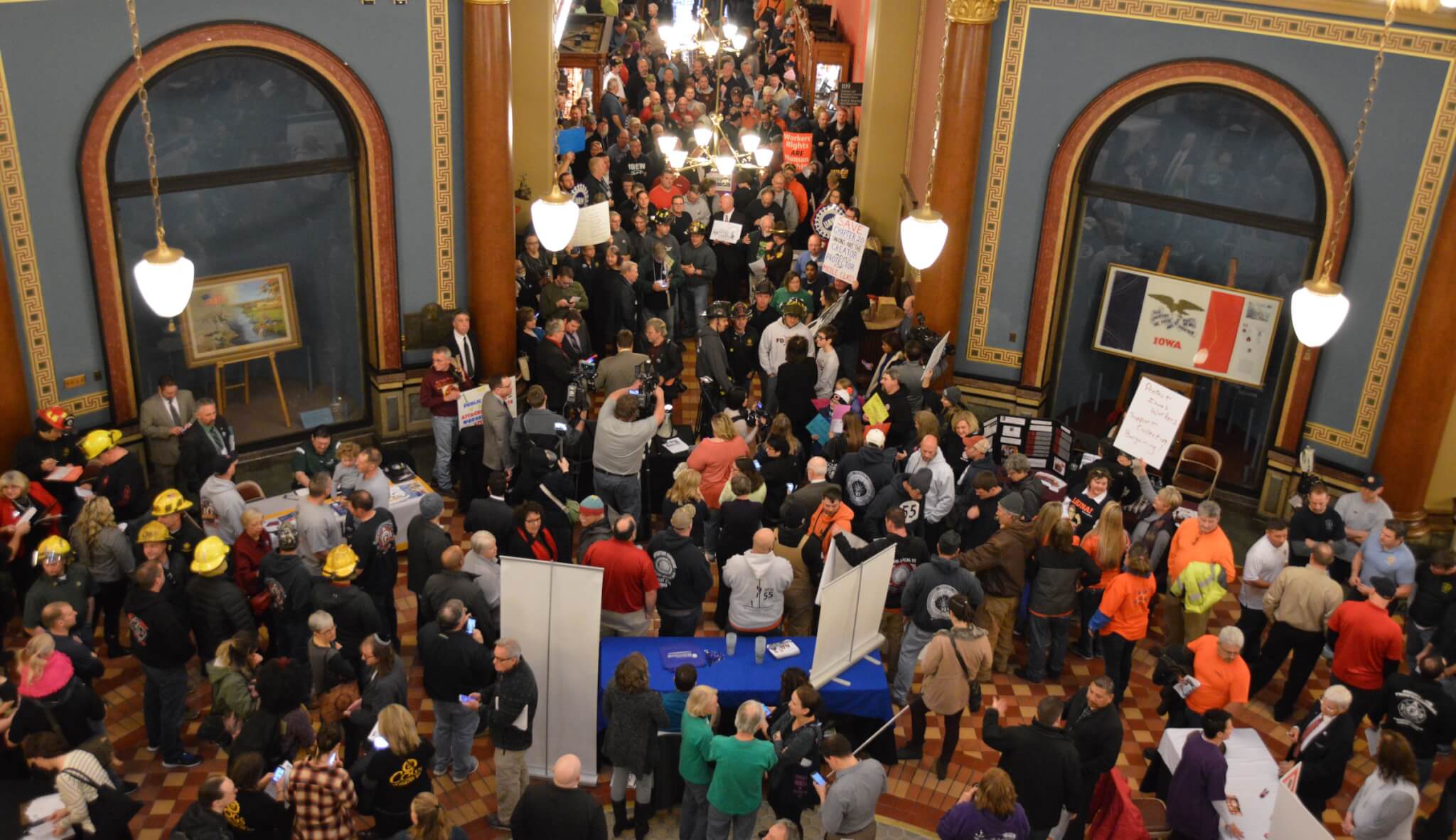
Gov. Kim Reynolds says her 2017 law gutting collective bargaining for many state and local workers was “badly needed” and “Iowans are better for it.”
But advocates for those workers say the opposite has been true in the past six years, with fewer employees handling even more work than before and paltry annual raises of 1% that don’t even cover the cost of inflation.
Such jobs used to be coveted for their pay and good benefits, said American Federation of State, County, and Municipal Employees (AFSCME) Council 61 president Rick Eilander. He added that this is no longer the case.
“People used to compete for these jobs. A couple hundred applied” for an open position,” Eilander said. “Now it’s five to 10 … And within a few months, those people quit because they’re like, ‘This ain’t what I want to do.'”
[inline-ad id=0]
Here’s what Reynolds said in this year’s Condition of the State address:
“In 2017, when Republicans took control of the legislature, we passed badly needed collective bargaining reform. We were accused of marginalizing and insulting public workers and told that we were ‘blowing up the system of reason and compromise;’ that our state government would never be the same.
“Well, they were right about the last part, but not in the way they expected. And they were wrong about everything else. Six years after these reforms were implemented, we’ve seen what’s possible when taxpayers have a seat at the table.
“And we’ve seen employee relations improve. Public employees now get rewarded for their work, not just their seniority. And rather than seeing each other as adversaries, our managers and employees are working together.
“At the Iowa Veterans Home, for example, the number of corrective actions has been cut in half and the number of terminations has shrunk by more than 50%.
“We ignored the hysteria, and Iowans are better for it.”
[inline-ad id=”1″]
There’s a lot in here, so let’s break it down:
‘Badly needed’ reform, or ‘more dangerous’ work environment?
The 2017 law was a direct attack on public unions’ ability to bargain, say Eilander and AFSCME political director Melissa Speed. (AFSCME is the largest public sector employee union in the state, covering approximately 183 public sector contracts from cities to counties to home health care and child care.)
While private unions and their employers can negotiate over any terms they like, including sick days, health insurance, workplace safety, and more, the government took that ability away for most of its state, county, and city employees (except a narrow “public safety” contingent).
Now, the only thing school districts, universities, and cash-strapped municipalities must negotiate are wages—and they remain prohibited from striking, a concession they originally made to keep all bargaining options on the table, Speed said.
“Since 2017, the workplace has gotten more dangerous,” Eilander said, noting the lowered pay and increase in mandatory overtime to make up for fewer staff was driving people to burnout or injury.
“We understand emergency situations when somebody calls in, but this is way beyond what it’s ever been,” he added.
[inline-ad id=”2″]
Improved employee/manager relations, or workers afraid to speak out?
Eilander and Speed both say the governor and her administration are aware of the issues they cite. They’ve held two meetings with her, laying out problems with retention, with union raises for all workers replaced by raises only for the boss’s favorite drinking buddy, and with corrections officers supervising a dangerous amount of inmates while their own numbers dwindle.
“On both occasions, she gave her assurance we would be treated with respect,” Eilander said in a statement after the Condition of the State.
He doesn’t believe that anymore.
“Her remarks made clear she does not respect public employees,” he said.
Unions that can only bargain on wages up to a certain limit and prohibited from striking is, quite predictably, leading to “low wages in an already competitive employment market” as well as “poor treatment by management,” Eilander said.
[inline-ad id=”3″]
He called on Reynolds to hold a town hall meeting with those employees if she really wanted to know what was going on behind the scenes.
“It’s quieted down employee complaints because they’re scared to be fired,” Eilander said. “Managers [are] like, ‘I’m not having a problem at all.’ That’s because employees are scared.”
As for Reynolds’ comment about decreased problems at the Iowa Veterans Home? Eilander and Speed say that’s nonsense, saying problems have instead been hidden under the state’s disciplinary board. They also pointed to recent turmoil over the former Vets Home commandant’s resignation and potential closure notice that has workers on edge.
“She wants the public to think everything’s wonderful there,” Speed said. “You’ve got employees there on mandated overtime because they’re short-staffed.”
[inline-ad id=”4″]
Future of work in Iowa
Before the law passed, 180,000 Iowans worked under a public union contract, or 36% of all public employees in 2016—a number that hadn’t meaningfully changed in decades, and a far higher number than the 6% of those covered by a private union contract.
But if the law’s goal was to gut union organizing as AFSCME contends, it’s worked: As of 2021, the last year for which data was available, just 27.4% of public workers were covered by a union contract—a nearly 24% decrease in five years.
“Before the speech, I had skeptical optimism it was going to slowly change,” Eilander said. “Things were moving in a direction of cooperation. We could talk, although it was very slow.
“After the speech, I do not believe good things are going to happen to public employees” in Iowa, he added.
Speed called on the governor to work with AFSCME to fix problems instead of put her head in the sand.
“We don’t have to be adversaries. We can be partners in this,” she said.
by Amie Rivers
1/12/23
[inline-ad id=”0″]
If you enjoy stories like these, make sure to sign up for Iowa Starting Line’s main newsletter and/or our working class-focused Worker’s Almanac newsletter.
Have a story idea for me? Email [email protected], or find me on Twitter, TikTok, Mastodon, Post, Instagram and Facebook.
Iowa Starting Line is part of an independent news network and focuses on how state and national decisions impact Iowans’ daily lives. We rely on your financial support to keep our stories free for all to read. Find ISL on TikTok, Instagram, Facebook and Twitter.
Support Our Cause
Thank you for taking the time to read our work. Before you go, we hope you'll consider supporting our values-driven journalism, which has always strived to make clear what's really at stake for Iowans and our future.
Since day one, our goal here at Iowa Starting Line has always been to empower people across the state with fact-based news and information. We believe that when people are armed with knowledge about what's happening in their local, state, and federal governments—including who is working on their behalf and who is actively trying to block efforts aimed at improving the daily lives of Iowan families—they will be inspired to become civically engaged.


Big corporations are suing to block Biden’s efforts to lower costs
From the cost of medication to education to everyday expenses, the Biden administration has passed several laws and implemented many federal rules...

Iowa Republicans make outlawing gay marriage key 2024 campaign priority
Iowa Republicans have made outlawing gay marriage a key goal in their 2024 party platform. During the Iowa GOP’s 2024 state convention on Saturday,...

Department of Justice says Iowa immigration law violates US Constitution
If Iowa doesn’t suspend the enforcement of its new immigration law by May 7, the state could face a federal lawsuit, according to the Des Moines...

Rushing: Iowa State president said the quiet part out loud
I want to thank Iowa State University President Wendy Wintersteen for doing us all a favor by finally saying the quiet part out loud: all the...

Iowa sets aside almost $180 million for year two of voucher program
Iowa has committed nearly $180 million in taxpayer funds to support private school tuition in the 2024-25 school year, which is almost $50 million...

Kalbach: Immediate action needed on corporate ag pollution
Iowa agriculture has undergone substantial changes over the past 40 years. We see it all around us. Rather than crops and livestock being raised on...





